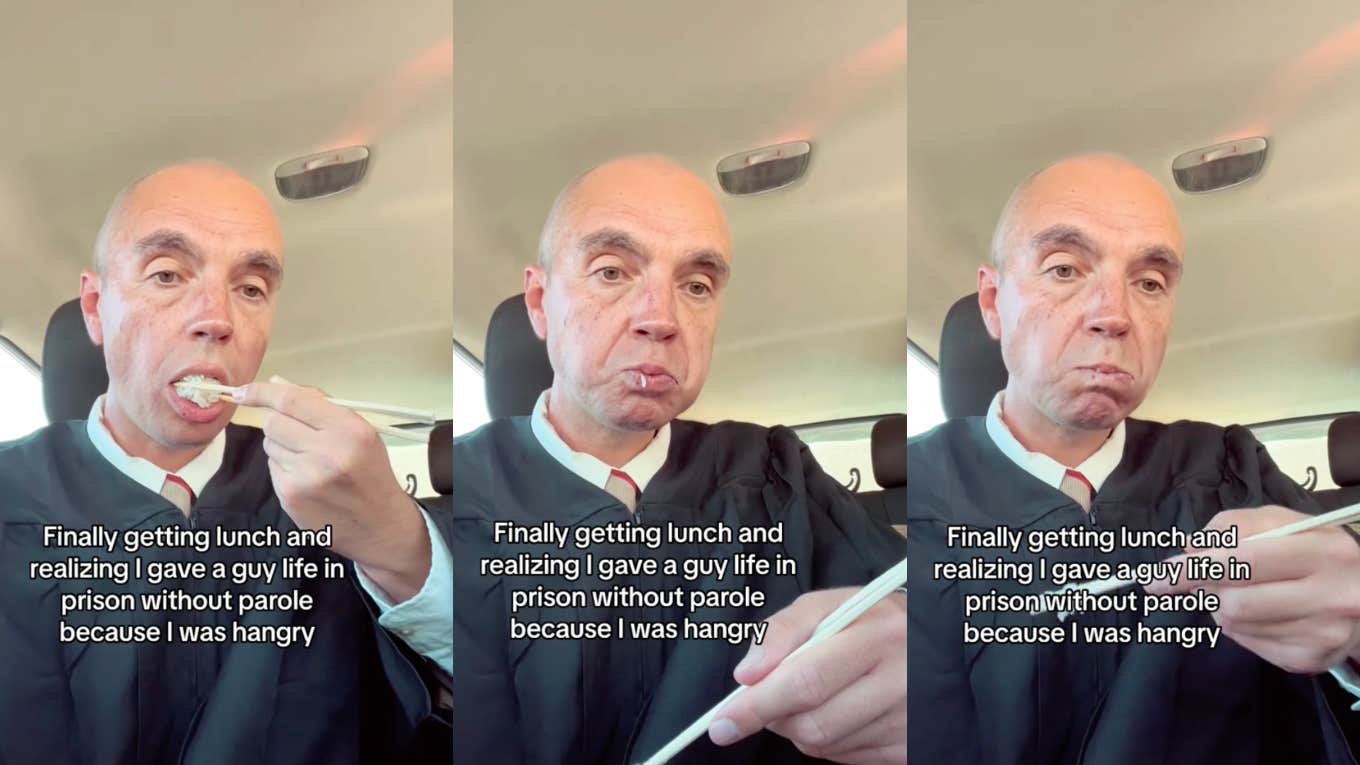The Disturbing Truth Behind Comedian's Bit About 'Hangry' Judges Giving Harsher Sentences
The 'hangry judge effect' is both unsettling and a reminder of just how messed up the justice system can be.
 @danhentschel / TikTok
@danhentschel / TikTok A comedian has gone viral on social media after making a "joke" about the correlation between judges who haven't eaten lunch yet and the number of harsh sentences given out in courts.
In a TikTok video, Dan Hentschel, who makes humorous content on his page, sparked a discussion after joking about the reason why judges often give out harsh punishments, and it all has to do with food.
He joked about giving someone a harsh sentence as a judge because he was only 'hangry.'
In the 11-second clip that Hentschel posted to his account, the comedian had been dressed as a judge and using the age filter on the platform. Sitting in his car and eating a meal, Hentschel wrote in overlay text: "Finally getting lunch and realizing I gave a guy life in prison without parole because I was hangry."
Hentschel video ended up getting over 3 million likes and 14,700 comments, as well as being shared on other social media platforms. While Hentschel isn't a judge and was only doing a bit for his followers, many people were still quite taken aback by the blunt admission.
The video, which was shared on X, formerly known as Twitter, garnered harsh reactions from people. "Is this grounds for disbarring?" one Twitter user urgently questioned, while another user added, "I’m going to assume that it’s a joke and that he likely didn’t even sentence anyone to life that day, but I think the fact that he made the joke at all is abhorrent."
Unfortunately, there is a truth behind hungry judges and harsher sentences.
While Hentschel's video was only a joke and he's not actually a judge, there has been research and studies done that link harsher punishments being given out whenever a judge is hungrier than usual.
According to research conducted at Ben Gurion University in Israel and Columbia University in New York City, they examined more than 1,000 decisions by eight Israeli judges who ruled on convicts’ parole requests. Judges granted 65% of requests they heard at the beginning of the day’s session and almost none at the end. Right after a snack break, approvals jumped back to 65% again.
While speaking to news publication Scientific American, Jonathan Levav, an associate professor of business at Columbia, said that the judges are often just grumpy from hunger, and also suffer from mental fatigue as well.
Per the Cambridge University Press & Assessment, the phenomenon is called the "hangry judge effect," and the argument is that after repeated decisions, judges become exhausted, hungry, or mentally depleted, and use the simple and less effortful strategy to stick with the status quo by rejecting the request.
At the end of the day, this research shows that judges, despite all of their power, are susceptible to these kinds of things, just like anyone else. And yet, this type of behavior is extremely disheartening and irresponsible, especially when looking at how this kind of thing has the power to drastically change someone's life.
In the United States, the justice system can't be talked about without bringing up the number of Black and Brown individuals who face these harsh sentences every day.
According to data acquired by the United States Sentencing Commission, Black male offenders received sentences on average 19.1% longer than similarly situated white male offenders. Black people have consistently outnumbered white people in the United States prison system, with Black people being imprisoned at five times the rate of whites.
This "hangry judge effect" only prompts reflection on the responsibility and accountability of judges, who, despite their authority, are subject to ordinary human vulnerabilities. Beyond the laughs that were meant to be elected through Hentschel's original video, it also serves as a reminder that we need calls for measures to ensure fairness, especially when the consequences are as significant as altering someone's life.
Nia Tipton is a Chicago-based entertainment, news, and lifestyle writer whose work delves into modern-day issues and experiences.

